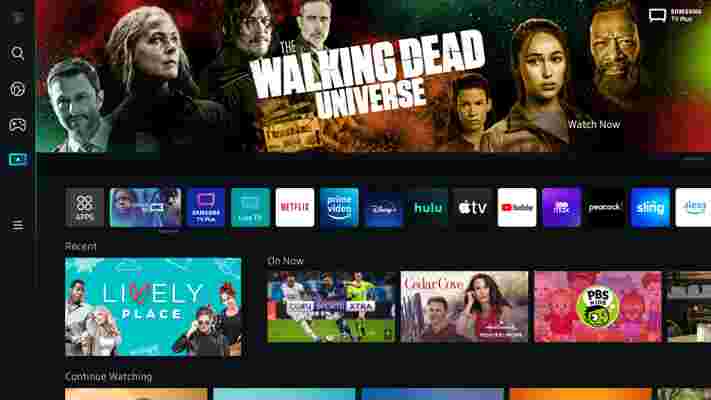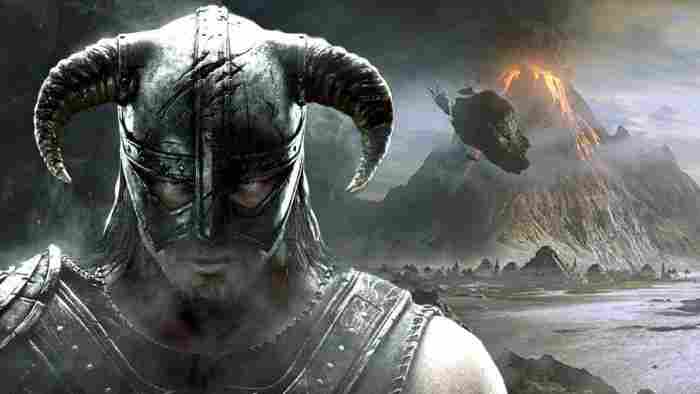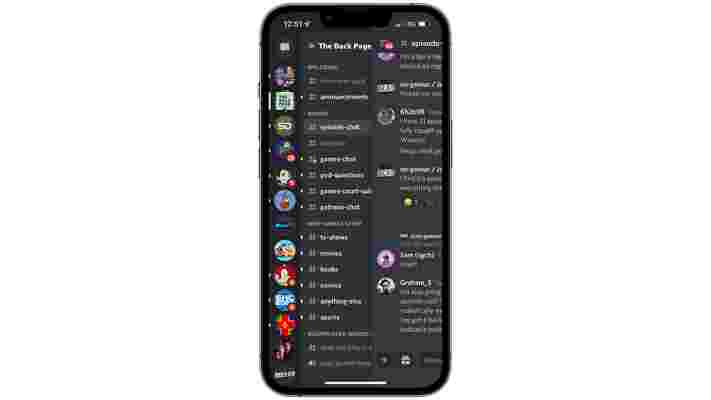When Samsung announced back at CES 2022 that its new 2022 QLED TVs would include an NFT marketplace, more than a few eyebrows were raised. For some, it represented a major shift in how NFTs are purchased and consumed… for others, well, it marked another venture down a lucrative rabbit hole that could set a bad precedent for the industry.
Whatever your current outlook on Samsung’s NFT project is, the company has announced that it’s doubling down on the venture with a new partnership with Nifty Gateway.
Nifty Gateway, in case you’re not in the know about NFTs, is a digital art online auction platform - basically, the place where people go to buy and sell NFTs. Once you obtain one from Nifty Gateway, you can then display it right on your TV.
For NFT lovers, having the ability to buy, trade, sell and display their wares right on their Samsung TV is going to be a groundbreaking opportunity - but as with NFTs themselves, there could be some risk in Samsung’s new investment.
Are non-fungible tokens the future?
Like it or not, NFTs are everywhere. They’ve overtaken cryptocurrency as the new tech buzzword and have even been made into a song by Saturday Night Live .
But, as far as NFT’s longevity is concerned, the jury is still out.
Part of the reason that NFTs haven't made their way onto the computers of more people is their volatility. They seem to pop up overnight, reach critical mass, and then plummet in price, not unlike some online scams.
There's a number of examples of this, but Jake and Logan Paul's harrowing experience wherein the pair lost significant cash on NFTs in 2021 or rug-pull schemes where NFT makers promise an experiential component and then run off with the profits before delivering both come to mind.
What Samsung is doing here, however, is certainly strengthening the case for an NFT future - by installing an NFT platform directly into its TVs, it’s lending credibility to and will likely enable more mainstream adoption of the technology.
In that way, Samsung’s partnership with Nifty Gateways is actually pretty exciting. But does it set a bad precedent? Is there any downside to Samsung’s newfound enthusiasm for NFTs? Not yet, really. But there might be some time down the road.
The hidden problem of hooking your TV into the blockchain
When it comes to home entertainment devices, TVs are pretty much top-dog. They’ve been refined over the years to be sharper, faster, brighter and more colorful. Recently, TV makers have made them better at handling 4K/120Hz inputs and new HDR formats, too.
A lot of research and development has been done to get them to this point.
Since the advent of smart platforms, software development has always been part of a TV’s development road map - but bringing NFT platforms on board might mean sacrificing some of the time spent implementing and improving other technologies.
There’s clearly money in NFTs - a lot of money, it seems - but we’re worried that the allure of profit could eat into the development of better features, starting a domino effect with other manufacturers looking to find new ways to maximize profit from TVs after the point of sale.

Historically, smart platforms aren't that secure
In the past, scrambling to make additional profit from TVs led TV makers to do some pretty shady things - Vizio previously monitoring the viewing data of 11 million TVs without consent comes to mind.
In the time since, we’ve seen data breaches, voice data collection and straight-up hacks of some smart TV platforms like Android TV. And while no one wants their personal data stolen - having a stranger login to your Netflix account is bad enough - having your financial investments taken from you is a whole different story.
There’s an inherent risk in adding a financial service to a smart TV platform - not to mention security and privacy concerns.
For many, we imagine, those may outweigh the benefits.
Play these classic Elder Scrolls games for free while you wait for Elder Scrolls 6
Bethesda has added a handful of classic games to Steam, ahead of its PC launcher shutdown.
The publisher added five classic titles to Steam on April 26 (via Kotaku ), four from the Elder Scrolls franchise and one from Wolfenstein. The best part? Three of these five games are free to play, allowing you to soak up some retro Bethesda goodness.
The five games added are The Elder Scrolls Arena, The Elder Scrolls II: Daggerfall, The Elder Scrolls Adventures: Redguard, An Elder Scrolls Legend: Battlespire, and Wolfenstein: Enemy Territory.
All of these games are free to play on Steam apart from Redguard and Battlespire, but both cost just over $5, so if you do fancy picking them up you can do so for relatively cheap.
The addition of these games comes ahead of the planned closure of Bethesda's own PC launcher. The publisher is gradually migrating its PC titles to Steam, with the official shutdown scheduled for May 11.
From April 27, those who have previously purchased games or have currency for the Bethesda launcher will be able to move their wallet and games to Steam. But you only have until May 11 to do this. At the time of writing, Bethesda hasn't said what steps you need to take to do this.
A long wait

Sure, these aren't necessarily the most popular games within the Wolfenstein and Elder Scrolls franchises, and they'll likely feel pretty clunky and outdated to play now, but adding them to your Steam library costs you nothing so you might as well give them a shot.
After all, it's nice to remind ourselves of Bethesda's roots, especially as we wait for upcoming blockbusters like The Elder Scrolls 6 and Starfield . While we don't have too much longer to wait for Starfield, with the action RPG set to release on November 11, it remains unclear when we'll get our hands on the next Elder Scrolls. We're hoping Bethesda sheds more light on the highly-anticipated next entry in the Elder Scrolls series during Summer Game Fest 2022 or at Gamescom 2022 , but we're not holding our breath.
So while you wait, you might as well play an Elder Scrolls game you may not have played before. After all, it's free, and it'll likely make you much more appreciative of the more modern games (for better or worse).
Want to leave Twitter? Here are three alternatives
Ever since news broke that Tesla CEO Elon Musk bought Twitter for $44 billion , users on Twitter have been freaking out about the fate of their favorite social media platform.
Many are expressing a desire to leave the service, mainly due to the behavior of Musk on Twitter. They have reasonable fears that the service could, under his direction, stray too far from what it is today and shift to some of Musk's interests like NFT's and cryptocurrency .
However, many are asking where they could go, instead. With this in mind, here are three platforms that could scratch the Twitter itch.
Discord

Once thought to be an app to only talk about your favorite games as you streamed on Twitch , it's grown into a place where you can create a 'Server' to discuss almost any topic you wish.
First launched in 2015, Discord allows you to be a part of communities over text, voice, and video, as long as you join the relevant Servers and abide by their rules. If you used to take part in forums on certain websites in the early 00s, you'll feel at home here. Those old forums also focused on topics where you could create your own threads and posts about related subjects.
The same rings true for Discord, but in a way that allows you to keep in touch with users through, say, video. It also integrates with Steam, Xbox, and your PlayStation profile, so you can let others know what games you're playing.
Mastodon

This is Twitter if it was open-source, and there were multiple instances of the social platform.
You can join Servers on Mastodon that can be seen as different communities, and you can be in multiple servers if you wish, although it can at times be confusing to tell which one you're in.
We've dipped our toe into the platform and, compared to Twitter, it's currently the equivalent of a desert in finding users who are interested in similar topics, mainly due to its many servers that you can join with your Mastodon profile. It mimics the layout of Twitter but you can also explore news and hashtags, then follow and 'boost', Mastodon's take on retweets, as you wish.
Due to the platform ironically trending on Twitter after the news broke of Musk buying the company, an army of new users marched over to Mastadon, which is now struggling to support them. So don't be surprised if your find Mastadon's operation slow, at least as compared to Twitter
While you'll be able to post and share as before, you may find users flocking back to Twitter after a short while.

Think of this as a bulletin-board website full of news and posts created by its users. You can 'upvote' and 'downvote' these posts, and these will be displayed in a rising list of 'subreddits' that will show you how popular the posts are with others.
While it's not a scrolling feed of people you follow, you can follow subreddits and your home page will give you a curated list of all of those topics, based on how new and popular they are across the day.
With over 450 million users on the site, it's unlikely you'll find a topic that hasn't been covered or doesn't have its own subreddit.